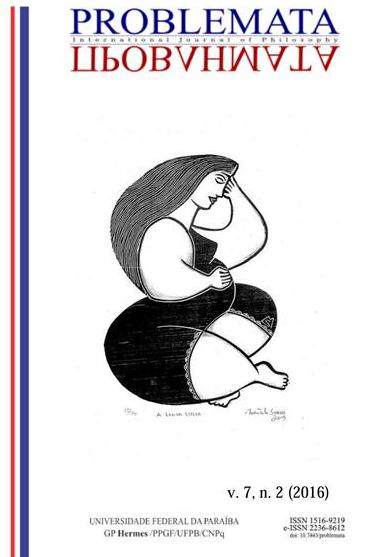Comparando interesses: Considerações sobre o "problema" que Arneson imputa a Singer
DOI:
https://doi.org/10.7443/problemata.v5i1.18216Keywords:
Peter Singer, Richard Arneson, Princípio de Igual Consideração de Interesses, Animais não-humanos, Seres humanosAbstract
Richard Arneson identifica um “problema” no Princípio de Igual Consideração de Interesses (PICI) proposto por Peter Singer: não seria suficiente para garantir a igualdade entre todos os seres humanos e, ao mesmo tempo, garantir a superioridade em relação aos animais não-humanos. O PICI reintroduziria a hierarquia do valor moral entre os seres humanos fundamentada na diferença das capacidades mentais apresentadas por cada indivíduo. Neste artigo, argumento que o “problema” identificado por Arneson é decorrente dos pressupostos intuitivos que assume, portanto, não é um problema de coerência interna da filosofia moral de Singer.
[doi:http://dx.doi.org/10.7443/problemata.v5i1.18216]
Downloads
References
ARNESON, R. J. (1999). What, If Anything, Renders All Humans Morally Equal? In.: JAMIESON, D. Singer and His Critics Philosophers and Their Critics. Oxford-Malden: Brackwell. p.103-128.
BENTHAM, J. (1979). Uma introdução aos princípios da moral e da legislação. 2 ed. Tradução de Luiz João Baraúna. São Paulo: Abril Cultural. (Coleção Os Pensadores).
CARVALHO, M. C. M. (2009). Quem são os membros da comunidade moral? Peter Singer, a senciência e as razões utilitaristas. In.: MORTARI, C. A.; DUTRA, L. H. de A. (orgs.). Anais do V Simpósio Internacional Principia. Florianópolis: NEL/UFSC. p. 343-35
FELIPE, S. T. (2001). Da igualdade. Peter Singer e a defesa ética dos animais contra o especismo. Philosophica, Lisboa, 17/18. p. 21-48.
KUHSE, H. (2003). La ética práctica de Peter Singer. In: SINGER, P. Desacralizar la Vida Humana. Introducción e edición de Helga Kuhse. Traducción de C. G. Trevijano. Madrid: Cátedra. p. 11-27.
SINGER, P. (1999). A response. In: JAMIESON, D. (ed.). Singer and his critics philosophers and their critics. Oxford-Malden: Brackwell. p. 269-335.
______. (2003a). Los filósofos recuperan su empleo. In: SINGER, P. Desacralizar la Vida Humana. Introducción e edición de Helga Kuhse. Traducción de C. G. Trevijano. Madrid: Cátedra. p. 75-90.
______. (2003b). Matar seres humanos y matar animales. In: SINGER, P. Desacralizar la Vida Humana. Introducción e edición de Helga Kuhse. Traducción de C. G. Trevijano. Madrid: Cátedra. p. 149-162.
______. (2003c). Todos los animales son iguales. In: SINGER, P. Desacralizar la Vida Humana. Introducción e edición de Helga Kuhse. Traducción de C. G. Trevijano. Madrid: Cátedra. p. 107-127.
______. (2006). Ética Prática. 3° Ed. Tradução da Second Edition (1993) de J. L. Camargo. São Paulo: Martins Fontes.
______. (2010). Libertação Animal. Tradução Marly Winckler e Marcelo B. Cipolla. São Paulo: Martins Fontes.
TELES, M. (2005). Mente Humana e Animal – as perspectivas de Susanne Langer e António Damásio. Phiiosophica, 25, Lisboa, p. 147-168.
WHITEN, A.; SCHAIK, C. P. van. (2007). The evolution of animal 'cultures' and social intelligence. Philosophical Transactions of The Royal Society B, 362. p. 603–620. Disponível em: http://rstb.royalsocietypublishing.org/content/362/1480/603.full.pdf+html Acessado em 07/12/2013.
Downloads
Published
Issue
Section
License
Authors who publish with this journal agree to the following terms:
- Authors retain copyright and grant the journal right of first publication with the work simultaneously licensed under a Creative Commons Attribution License that allows others to share the work with an acknowledgement of the work's authorship and initial publication in this journal.
- Authors are able to enter into separate, additional contractual arrangements for the non-exclusive distribution of the journal's published version of the work (e.g., post it to an institutional repository or publish it in a book), with an acknowledgement of its initial publication in this journal.
-
- Authors are permitted and encouraged to post their work online (e.g., in institutional repositories or on their website) prior to and during the submission process, as it can lead to productive exchanges, as well as earlier and greater citation of published work (See The Effect of Open Access).





